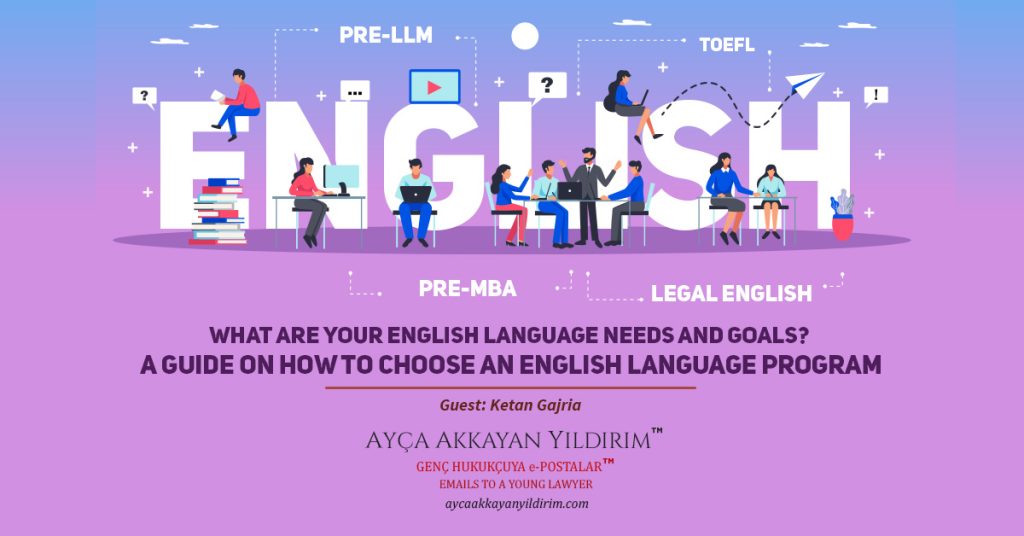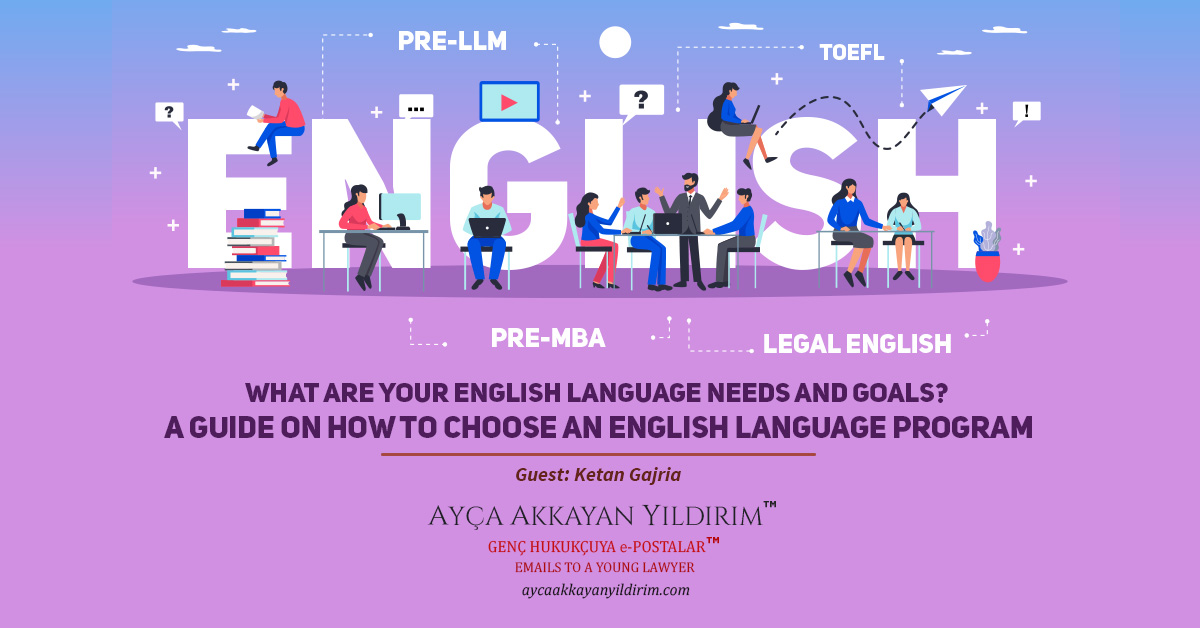Tuesday, March 23, 2021


Date : March 23, 2021
To : Young Lawyers
Re : WHAT ARE YOUR ENGLISH LANGUAGE NEEDS AND GOALS? A GUIDE ON HOW TO CHOOSE AN ENGLISH LANGUAGE PROGRAM
ENGLISH LANGUAGE & ORIENTATION PROGRAMS BOSTON UNIVERSITY CENTER FOR ENGLISH LANGUAGE & ORIENTATION, BOSTON, MA, USA
Ketan Gajria, Associate Director of Business Development of Center for English Language & Orientation Programs (CELOP) of Boston University’s Global Programs, many thanks for taking the time to answer my questions about improving English language skills. Defne Kahveci
DK: Associate Director Gajria, I understand that Boston University offers a wide range of programs for improving English language skills or gaining professional knowledge for work or graduate studies. To begin with, could you please briefly explain the programs CELOP offers?
KG: Correct, whatever your interest is, we likely have a program for your needs. Our professional programs include Legal English and Foundations of the U.S. Legal System for students with a background in law. We have several business programs including Pre-MBA and programs focused on innovation and entrepreneurship. Next year, in collaboration with Boston University’s School of Hospitality, we also plan to offer a Pre-MMH program for students interested in a Master’s degree for the hospitality and tourism industry. We also offer a full range of general and academic English programs including the ability to study on-campus in Boston or remotely for 4-12 weeks, part-time or intensive, the opportunity to take a BU credit class alongside English, TOEFL preparation, as well as programs for secondary school students to learn how to apply to and succeed in their university studies.
DK: What should the prospective applicants take into consideration when choosing a CELOP program?
KG: Given our range of programs, we recommend that prospective applicants consider these questions:
- What are your English language needs and goals: do you need general and academic English or English for a specific professional purpose?
- Do you want to study in-person at Boston University or remotely from your home country?
- If you want to study in-person, do you want to study part-time as part of a visit to the U.S. or to come as a full-time student for an intensive program?
- If you want to study in-person, do you want to live on-campus at BU in our residence halls with a meal plan or live off-campus (for example, in an apartment or homestay)?
DK: What is the application process for Intensive English Programs?
KG: As part of Boston University, CELOP has an online application based on the University’s system. For our intensive, or full-time programs, the application process includes these steps:
- The student creates a BU account and completes an online profile including personal information and program selection and pays an application fee
- The student provides scans of the passport and financial documents showing funds to cover program costs. Our list of dates and fees is available on our website.
- CELOP accepts the student and provides an I-20 for them to obtain a student visa
We have a step-by-step guide for completing an application on our website. Throughout this process, the student can get help from the CELOP Admissions team, including our Foreign Student Advisor (DSO) for their questions on any topic: choosing the right program, completing the application, getting a visa, etc.
DK: Could you please explain the application process for Legal English & Foundations of the U.S. Legal System Program?
KG: The application process for this program is similar to the one above for our intensive programs, but has some additional requirements. Specifically, applicants must submit additional documents during the process. If the applicant has already been admitted to a U.S. LL.M. program, the required documents are a copy of the acceptance letter and CV. If the applicant has not been admitted to a U.S. LL.M. program, then they must send a 300-500 word statement of purpose explaining their interest in the program, a copy of their CV, and proof of English proficiency with either a TOEFL 85 (iBT) or IELTS 6.5.
DK: Now I would like to focus on programs specifically for law students and graduates. Nowadays, Turkish law students and graduates tend to prefer summer programs to improve their legal English skills and become familiar with U.S. legal system instead of LL.M. programs, as LL.M. programs are more time consuming and costly. How would, in your opinion, participating in summer programs will help students/lawyers from Turkey to understand U.S. laws?
KG: Boston University’s Legal English and Foundations of the U.S. Legal System program was designed with the needs of law students and legal professionals who want to grow their knowledge of the U.S. legal system as well as legal English. The program, in addition to a component focused on developing spoken and written English skills necessary for the effective practice of law, also has a component taught by a trained lawyer that introduces students to the U.S. legal system, investigating the governmental, economic, historical, and sociological environment in which it functions. Lastly, students who are able to join the program in person will be able to participate in onsite activities designed to give insight into the legal system in practice and present opportunities for networking with legal professionals in the Boston area.
DK: I understand that CELOP also offers U.S. Business Law for the International Lawyers Program. Could you please tell us how this program differs from Legal English & Foundations of the U.S. Legal System Program?
KG: The U.S. Business Law for the International Lawyer Program is focused on practicing lawyers who need a foundational understanding of U.S. corporate, business, and transactional law. The program is ideal for lawyers educated outside the U.S. preparing them with the knowledge and skills needed for the increasingly competitive global legal market in which they may be asked to represent clients in multi-jurisdiction business transactions. The focus of this program is on developing a practical understanding of how U.S. business lawyers represent their clients’ interests in a range of core topics, such as entity formation, contract negotiation, intellectual property protection and dispute resolution.
DK: I have met with many law students and graduates from Turkey who are reluctant to participate in summer school programs thinking their English skills would not be sufficient to understand the subjects and participate in the discussions, even though they can demonstrate an appropriate level of English proficiency with certain tests. I believe this could be closely related with not being able to use English in daily life or at work; which could result in their English skills to get rusty. In order to be able fully benefit from what the programs offer and overcome such problems, would there be anything you could suggest before attending the Legal English and Foundations of the US Legal System Program or U.S. Business Law for the International Lawyers Program?
KG: We all hesitate to take advantage of opportunities that we think may be too challenging for us but embracing challenge and being open to unique learning opportunities is the only way to continue to grow. Other participants in the program will be in the same exact boat as you are and the first week will be tough but you will realize how quickly your English improves once you use it! While there is no need to prepare for the program, it can never hurt to do some prereading of material or engage with others in English.
DK: Considering the relatively short nature of the summer school programs, what should the attendees do to make the most of their summer school experience?
KG: Students have an incredible range of opportunities available to them when they come study at Boston University. First, through their program they will get to know their classmates who represent legal professionals from all over the world, as well as program faculty from both CELOP and the BU School of Law who are experts in their fields. Students should build and maintain relationships with them as they progress in their legal career: they might help you in the future! However, there are many opportunities beyond the program itself. Studying in Boston, one of the oldest cities in the U.S., is also an invaluable cultural experience. Students can visit our world class universities (7 of the Top 50 as ranked by U.S. News and World Report), dozens of museums and historical sites, world-class restaurants and shopping centers, and more.
DK: From my personal experience, I know that participating in summer school programs were helpful for my LL.M. applications, especially in terms of showing my legal English skills and interest in common law. Do you think that participation in CELOP programs affect one’s chances of admission to LL.M. programs in U.S.?
KG: Although participating in a CELOP program is not a formal pre-requisite for application to an LL.M. program, our students have told us they felt better prepared for their program due to their improved English, better understanding of university studies and how to take advantage of what an institution like BU offers, increased comfort and familiarity with U.S. culture, and for students choosing to study in Boston, a real understanding of the city and how to make the most of their experience there. As such, participating in the program is also a great way for students to ensure they succeed when they begin their LL.M. studies.
DK: Does CELOP offer graduate admissions advice to its students?
KG: CELOP students have the opportunity to meet with our team of University Admissions Advisors who can help them research graduate school options, understand the application process, and provide feedback on admissions essays. This service can be a great help to students unfamiliar with the graduate admissions process.
DK: Do you have any final comments for Turkish law students and graduates reading this article?
KG: The opportunity to join a Legal English program is always a good idea whether you are planning to study in an LL.M. program in the U.S. or not. Not only does it present opportunities for you to grow your knowledge of legal English and the U.S. legal system, it also provides the chance to expand your network with likeminded legal professionals from around the globe. If you are interested in learning more, please get in touch with us at celop@bu.edu so we can learn about your goals and help you decide if our programs are right for you.
